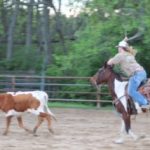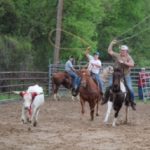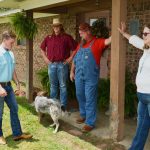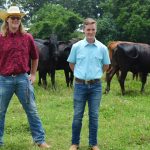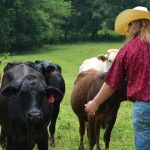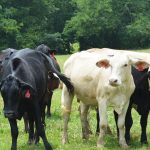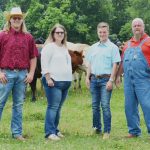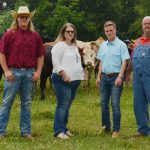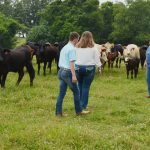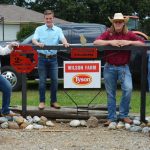Wilson’s NC Farm Family of the Year

PRESCOTT – Gregg and Marcell Wilson have been named Nevada County Farm Family of the Year.
The family consists of sons Justin and Kyle, both 14, and Aaron Johnston, 35, and Jennifer Johnston, 32. The Johnston’s live elsewhere, while the rest life in a brick home off Nevada 227.Theirs is a combination farm, with cattle, chickens and hay. They own 40 acres, and rent a total of 846.
The Wilson’s have been in the poultry business for 10 years. They have more than 30-years experience with cattle, horses and hay production. They grow chickens for Tyson’s with 10 broiler houses growing 19,100 per house. The chickens are raised to a weight of seven pounds or 49-53 days.
The cow-calf operation varies per season. They sell locally at the Hope Livestock Auction and also in Oklahoma at the Oklahoma City stockyards and Welch Stockyards. As to hay production, the Wilson’s normally bale 1,500 round bails per year on average, depending on rain and weather conditions. The hay is used to feed and support the cattle side of the farm.
The Wilson’s raise Texas Longhorn, Charolais and cross-bred cattle, while working 388 acres of pasture for hay.
They also contract out to other businesses to remove the cake out, and selling poultry litter from their 10 houses. Local farmers use the litter as fertilizer for their pastures to increase their yields. A contractor is used to remove and properly store the litter in a shed on the property. The contractor later removes the litter and delivers and spreads it on the buyer’s land. Wilson said litter removal/storage and the selling/delivery of the litter is labor intensive and contracting is required. This allows the farm to operate without having to hire additional help or otherwise affecting the farm’s operations.
The farm also contracts with several local vendors, such as electricians, construction crews and gravel haulers to get things done. Just Poultry is used for the farm’s computer needs, and the Wilson’s also use local fuel suppliers, veterinarian services, pest control and cooperative resources to keep the farm up to Arkansas codes and assure a successful operation.
Their goal is to upgrade and sustain the operation of the farm for the twin boys, Justin and Kyle. To help achieve this, Greg and Marcell have built a new litter shed, bought two large generators, bought farm equipment, including tractors, balers, cutters and flat-bed trailers, increase the cattle operation, decreased the debt liability and cleaned the property up.
In their second year of operation, the Wilson’s lost ¾ of their flock two days before shipment was due. The generators overheated in 100 plus degree weather. The family worked to clean the dead birds up, but only managed to clean on house overnight before exhaustion set in and the temperature began rising again. Wilson said flock insurance can’t be bought in Arkansas, so this was a major loss of income for the farm and family, as they had to contract with a company to dig out an area for the dead flock and clean the birds from the other nine houses. To get operational again, Greg borrowed from her 401k plan, while Marcell and the boys emptied out their savings accounts. They used some of the money to buy new generators and roll up doors for the houses.
For the future, the Wilson’s plan on buying more land, building a hay storage facility and replacing the gas incinerators.
To protect the environment, the Wilsons, in 2008, obtained $15,000 from the United Stated Department of Agriculture (USDA) for the construction of a waste storage facility. The grant deferred some of the cost of a 40×94-foot litter shed. The shed is used to keep from contaminating water sources; maintain compliance with state and federal environmental quality rules and regulations; secure wildlife habitat incentives; and adhere to conservation security. In addition, the family use best practices agriculture management, which results in 1,533 tons of chicken litter stored and removed by contracting between batches. They also adhere to strict biosecurity measures to avoid contamination.
All lighting has been replaced with energy efficient bulbs, with new brooders installed to save natural gas. Foam insulation was sprayed inside the housed to help make them more energy efficient as well. Additionally, roll up doors were installed and the fans updated in the houses. Along with this, the farm donates all recycle products, such as paper, plastic and aluminum, to the Nevada County Recycle Center.
The two grew up around horses and cattle, but neither knew anything about broiler houses or how much work was involved with them when they started out. In 2007, based on a feasibility study, Greg’s employer was looking at closing the Texarkana plant where he worked. He’d been there less than 10 years, and his former employer had a strict no-rehire policy.
“At the age of 38, I was faced with the possibility of having no job or trade,” he said. “My wife and I were looking for me a way to make a living for our family. I was visiting a friend and he told me there was a farm for sale.” Greg had been in the FFA in high school and worked on a thoroughbred horse farm when he was 15. Farming seemed to be an area to be considered.
He called his father asking if he wanted to buy some chicken houses. Though supportive, his father asked if he’d lost his mind and hung up on him. However, the next day he and his father went to look at the farm and talk with Farm Credit. His 94-year-old grandfather, Frank, sat in a lawn chair and watched the first batch roll off the farm. Frank had also owned chicken houses in his younger years and enjoyed watching the modern process of raising broilers, and enjoyed watching the birds leave the farm until his death in 2010 at the age of 97.
Everyone in the family plays an important part in keeping the farm going. Greg’s father, Jerry, is his “right hand man”, helping with the chicken houses, feeding cows and horses, running errands and buying supplies for the farm. When Greg isn’t working at his other job, the family works the hay fields with the twin boys. He said Justin can do what most grown men can do, and he’s just about 15. Justin also helps in working the cattle, doing worming and penning, while being an “accomplished fence man”. Kyle is quick and takes care of the water lines to the broiler houses.
Marcell makes sure the grounds are kept clean and mowed, while mowing an abandoned cemetery across the road from the house. Everybody pitches in and helps, and helped when the massive poultry loss occurred in ’09.
Greg has been active with the athletic booster club at Prescott High School, where Justin will be playing football. He’s also been in Leadership Nevada County, is a member of the Pleasant Hill Cemetery Association and the Artesian Cemetery Association, a new group. On the state level, he’s worked with the Nevada County Conservation for registration of poultry feeding and dry waste practices.
Marcell is a member of Central Baptist Church, where she was a pre-school assistant for Sunday School, and member of the Awanas where she was the Cubie Assistant Leader.
Justin recently attended a football camp in Russellville, but wasn’t thrilled with the college, saying the dorms reminded him of jail cells as they were small and didn’t have windows. He will be attending a Razorback football camp later this summer.
Kyle also takes care of the family’s dogs. There are now 11 as some of the bitches recently had puppies. He also helps around the house in other ways.






